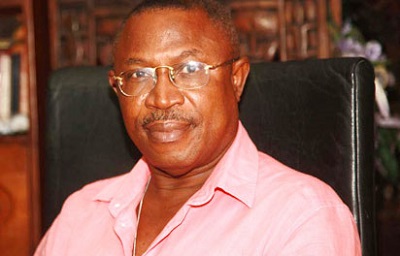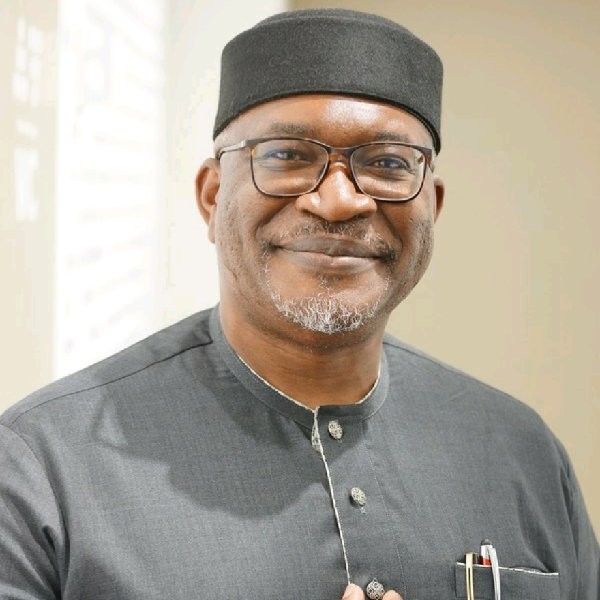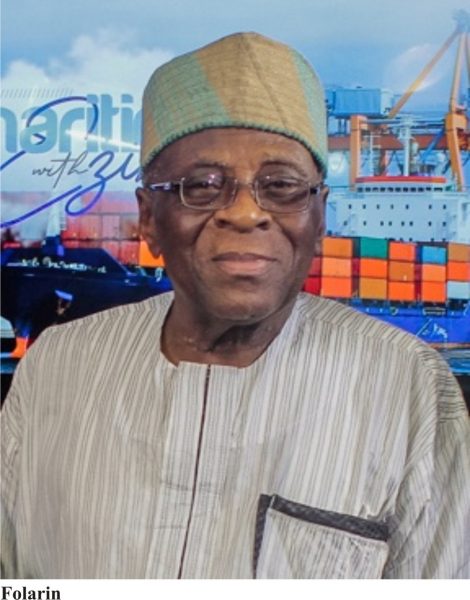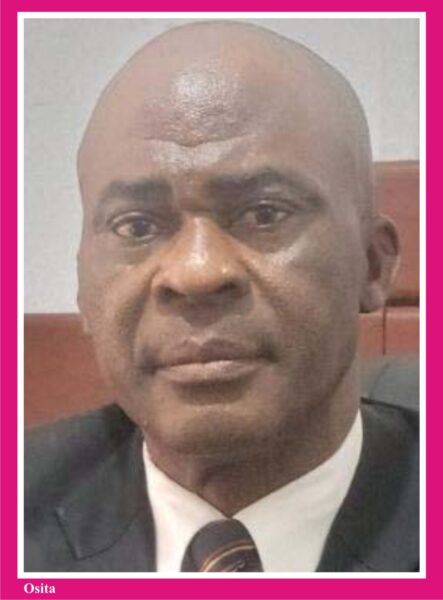Why Foreign Vessels Dread Nigeria- Mina

Mr. Mina Oforiokuma is the Chief Executive Officer of Sopetro Marine Limited. He is the Downstream Coordinator of the Ship Owners Association. He is also the Chairman of Shipping and Logistics Group of the Nigerian Content Consultative Forum (NCCF) and he is a governing council member of the Nigeria Chamber of Shipping. In this exclusive interview with MMS Plus, he reveals the covert reasons why foreign vessels flee Nigerian waters; he also unravels the role of ship-to-ship transfer in the subsidy scandal, the ideal model for Nigerian maritime fleet and more intriguing disclosures.
Kenneth Jukpor writes…
As a veteran in the Midstream and Downstream oil sectors, how would do analyze the challenges facing the sectors especially ship-to-ship transfer of oil?
With respect to ship to ship transfer, basically we are talking pure petroleum sector of the Nigerian oil and gas industry. What happens today is that Nigeria is the highest oil producer in Africa and Nigeria is also the highest importer of refined petroleum products to satisfy the nation’s internal consumption. About 95% of petroleum products utilized in Nigeria come from foreign countries while only about 5% is refined in nation.
For the import of gasoline and premium motor spirit (PMS), most of the mother vessels that bring the cargo have several challenges. These cargoes come in big mother vessels, most of them are between 80,000 tons to 150,000 tons.
Until 2012, most of these mother vessels dropped anchor offshore Cotonou. As a result of security problems caused by pirates and terrorism which led to hijacking of vessels and illegal transfer of petrol not only in Nigeria but across the West African coast, the negative effect of these attacks gave rise to the Joint War Committee (JWC)of Lloyds’ of London. JWC pronounced that the area from the limit of Togo and Benin republic maritime boundaries all the way along the gulf of Guinea to the maritime boundary of the republic of Nigeria and Cameroon to be declared as a ‘War Risk Zone’. Today, these tankers drop anchor offshore Lome.
The effect of JWC’s action was that the foreign mother vessels which ar usually insured by the Protection and Indemnity club would not risk going into the ‘war risk’ areas because the moment they transgress, their insurance premium increases by more five times. We are talking about tankers of about 100,000 deadweight tons and most of them were made in the 2000’s and they could cost 60- 70 million dollars. The insurance premium for these vessels ranges from $300,000 to $500,000. If any of these tankers transit into the war risk zone, for the period they are in the zone, they are uninsured with the normal insurance except they take an extra war risk insurance (EWRI) premium. A tanker that has an annual insurance premium of $500,000 for example, the EWRI premium will cost $15,000 per day. So, imagine if such a tanker stays in Nigeria for 30 days, its EWRI premium will be $450,000 for 30 days while its annual insurance is $500,000. This is the primary reason why most of these foreign mother vessels refuse to come to Nigeria.
What is the way out of this quagmire?
The government needs to wake up to its responsibility. Why hasn’t the federal government of Nigeria made any entreaty to Lloyds of London? We have the Nigerian Maritime Administration and Safety Agency (NIMASA). We also have representatives at the International Maritime Organization (IMO), we have a ministry of transportation and we have an embassy in London. It beats my imagination that nobody has taken any step in that direction to ask why or to provide the necessary protection to the zone in order to give confidence to the international insurance community so they could lift the restriction. Sometime ago there was a lot of piracy in Singapore and also along the straits of Singapore but they have resolved their issues.
Did the ship-to-ship transfer play a role in the subsidy saga Nigeria witnessed in the past?
It eventually got there. If those mother vessels were able to station offshore Lagos, there would have been more monitoring and a lot of the fraud that transpired during the subsidy saga in 2012 would not have happened. The reason that fraud took place was the gap created by the ship to ship transfer in Lome and the transportation into Nigeria.
The fact that those tankers could not come into the war risk zone meant they had to drop anchor at Lome where Nigerian tankers went to do the ship to ship transfer, meant there was enough opportunity for fraudulent activities between the point of loading the oil at Lome and discharging in Nigeria. There was room to falsify documents, to compromise in terms of quantity loaded and quantity discharged.
If these tankers were stationed offshore Lagos, they would have been under the scrutiny of the Nigerian Navy, Customs, DPR and other agencies and it would have been very difficult to manipulate the system as they did. Even today, over 90% of the mother vessels that arrive at Lome are destined for Nigeria.
There is also the issue of security. The government of Togo is spending so much just to guarantee the safety of those tankers because the Togolese Navy patrols that area, that is why Togo has been removed from the war risk zone.
Ships are worldwide commercial cargo carrying entities. Wherever a ship is located, it requires the same level of security, support and service which we don’t give in Nigeria. If those ship to ship transfers were done in Nigeria a lot of clearing agents would have been enriched, companies would have to supply the STS equipments, even marine surveyors would have to remain onboard and Mooring masters would have been engaged also, but we lost all these.
What role would a national carrier have played in curbing these anomalies, if we had one?
National carrier is a completely different thing. The business model that is ideal in Nigeria is one that has been debated by various schools of thought. We talk about national carrier all the time but we should realize that there is something called ‘copy technology’. In Nigeria, we cannot reinvent the will. There are certain business models that have been applied by developing countries in other parts of the world, if we can’t emulate them, I can’t understand the various schools of thought on the establishment of a national carrier.
NNPC was established around the same time the Brazilian Petroleum Corporation – Petrobras and the Malaysian Petroleum Corporation – Petronas. These are national oil corporations that were on the same level with NNPC few decades ago. However, Petrobras has a transport subsidiary called Transpetro which has over 80 vessels and Petronas also has a transport arm called the Malaysian International Shipping Corporation (MISC) which has acquired over 100 vessels meanwhile Nigeria still hopes for a national carrier. When we talk about local content and development, these nations were Third World countries with Nigeria in the 1960’s and 1970’s but Malaysia and Brazil have far exceeded Nigeria in terms of developmental index.
However, there are some tankers that come directly to offshore Lagos, they are the PMS tankers ordered by the Pipelines and Products Marketing Company (PPMC) on behalf of the federal government of Nigeria. The tankers that station offshore Lome which fuelled the subsidy scandal were private downstream operators or indigenous tankers, but the government is also involved in Offshore Processing Agreements (OPA) that is signed between NNPC and certain Nigerian oil companies. 445,000 barrels of crude oil is allocated for crude oil swap by the Nigerian government to some oil companies to take to foreign refineries in exchange for PMS. However, about 80% of the crude never get to any refinery, they are traded on the international oil market and these companies bring PMS in exchange for the crude. Today, there are over thirty (30) PMS foreign tankers outside Lagos, they will come in and NNPC will pay the extra war risk insurances premium. Most of these tankers stay in Nigeria for 40 days and sometimes 60 days before discharging the cargo and NNPC is paying demurrages between $25,000 and $30,000 per day. I will like someone to investigate and audit NNPC’s demurrage bills for the last ten (10) years. In the last 10 years, NNPC has lost over $5 billion on demurrage and extra war risk insurance premium to foreign tankers. Which amounts to $500 million a year, I challenge NNPC to go and do their audit.
On Dual Purpose Kerosene (DPK) popularly known as kerosene, which is mostly utilized by the masses especially the poor, the commodity is not accessible to the local people because kerosene is also imported on the same crude-swap arrangement and these kerosene tankers are also offshore Lagos incurring demurrages and EWRI premium.
These are very crucial national issues, how come no one is talking about them at such a time when the nation is focused on cutting revenue leakages?
It is ignorance. Those in authority think they know, but this is something they are not aware of. The government of foreign countries always engages the operators in an industry to get advice on how to handle things. I am a downstream operator and I can definitely tell you that the government needs to be engaging the right people.
I delivered a paper to the Local Content Committee of the House of Representatives in 2011 and everything I am saying now, I said them at that time before the major subsidy saga in 2012. What is point of talking to people paying deaf ears? I am a businessman and I should simply face my business but I’m a Nigerian and the future of this country is in our hands.
On the issue of national carrier, why should we go through several schools of thought when Brazil and Malaysia have done it? Can’t we copy what they did and even do it better? Today, Japan is the best television and car producer in the world but they simply copied the Americans and did it better. It is called ‘copy technology. Let us look at what Brazil and Malaysia have done and inject Nigerian ingenuity to come up with something better and adapt it to our local environment.








